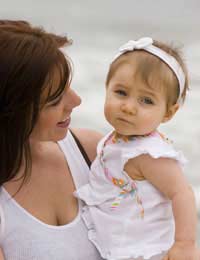A Child's Relationship With Their Mother

A child’s development encompasses many aspects including the physical social, emotional and cognitive/mental. In order for children to develop in all aspects, they must be supported in all areas and the one person most often responsible for this encouragement is the mother. Mothers tend to be the primary caregiver in both traditional and single parent families and thus are with their children more than anyone else. Mothers, therefore, are in the unique position of influencing their children’s growth is all areas of development, beginning with the bonding and attachments that they usually develop with their children.
Mother Child Bonding
Mothers and their children are generally said to bond in the first few hours after the birth. Bonding, or the development of trust between a mother and her child, begins from the moment the two are brought together. During this time mothers often breastfeed their children and hold them close, thus keeping the two in physical contact for the first precious hours and days of the infant’s life.There are many reasons that mothers and their babies may not be in contact immediately following birth, such as complications with the delivery or a premature baby that requires medical treatment, and a physical distance does not in any way mean that bonding will not occur. On the contrary, it is when mothers and babies are in close contact but do not bond that there may be long lasting consequences.
There is plenty of time for bonding in the first six months or so, so mothers should feel no pressure to bond instantly with their children. Instead, through meeting her child’s needs and giving the child reasons to trust her, a mother builds up a bond over many months.
Mother Child Attachment
When babies become toddlers they know that their mothers are the primary individuals to meet their needs and so the initial cycle of bonding has been completed. At this time, however, toddlers are beginning to realise that they are their own individuals and now have the mobility to test the boundaries that their mothers have set for them.As a child explores, usually through trial and error, (s)he will come to realise that his/her mother’s limits have been instated to keep him/her safe and so will again come to trust the mother. With this realisation and resulting trust the second stage of bonding is thus complete, but through the affection that they share for each other the mother and child will also have developed an attachment. According to theorist John Bowlby, this affectional tie will become the template of all relationships that the child goes on to form throughout his/her life. Clearly a mother’s work in the first years of a child’s life has great importance.
While a discussion of a child’s relationship with their mother could easily become a highly involved, deeply psychological or sociological dialogue, it needn’t be so. Instead, any such discussion can be boiled down to the basics: the mother child relationship is probably the strongest relationship in a child’s early life and it will become the template on which later relationships are based.
It may seem somewhat intimidating to new mothers who fear “messing up” or somehow “ruining” their children, but in most cases developing a bond and later an attachment is a purely natural development. Mothers needn’t worry about if they are developing the “right” relationship with their children or if they are going about mothering “correctly” – there is no external standard to which they must perform. Instead, all mothers should do what feels natural and right to them, and as long as they are happy then chances will be good that their children will be too.
- Does Birth Order Really Effect a Child's Development?
- Sibling Relationships and Birth Order
- Interactions Between Babies
- Children Making Friends
- A Child's Relationship With Their Father
- A Child's Relationship With Their Grandparents
- Relationships Among Siblings
- Sibling Rivalry in Children
- Strengthening Family Relationships
- Attachment Stages
- Separation Anxiety and Children


Re: Speech Therapy for Children
Dear Speech Therapy Clinic, I am writing to inquire about speech therapy services for my 3-year-old son. I have noticed that he…
Re: Child Temper Tantrums
I often use my book center for a calm down center. It is not a punishment but a place to take a break and calm down quietly
Re: Mahler's Theory of Development
I'm learning a lot about the end theories .
Re: Child Temper Tantrums
As an assistant director, I get brought kids who the teachers are struggling with to help calm them down. I bring them into my office, we…
Re: Brain Development in Young Children
Hi I have a son. He is 2 and half years old and he is diagnosed with autism. He doesn’t respond to his name and appears…
Re: Child Temper Tantrums
i think once you start to learn the child handling their behavior is easier. it takes time but patience is a virtue!
Re: Erikson's Theory of Psychosocial Development
No, children develop in their own pace for example, a 1-year-old would develop to hold a pencil and another…
Re: Extra Tutoring: How Do I Pay?
i am looking to help out students with private tuition as their parents cant afford it i would like to apply for grants or…
Re: The 'Terrible Twos'
child throws temper tantrum when its cleanup time even when singing the cleanup song, hits my hand and starts pulling the toys back out of the…
Re: Child Temper Tantrums
we work with 5 year olds to 12 year olds.We try to tell the kids what are the basic rules the first day of school.We call them friends from…